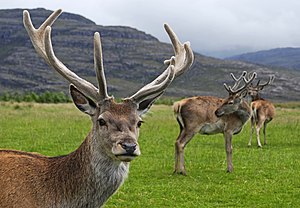
The fauna of Scotland is generally typical of the northwest European part of the Palearctic realm, although several of the country's larger mammals were hunted to extinction in historic times and human activity has also led to various species of wildlife being introduced. Scotland's diverse temperate environments support 62 species of wild mammals, including a population of wild cats, important numbers of grey and harbour seals and the most northerly colony of bottlenose dolphins in the world.
Many populations of moorland birds, including the black and red grouse live here, and the country has internationally significant nesting grounds for seabirds such as the northern gannet. The golden eagle has become a national icon, and white-tailed eagles and ospreys have recently re-colonised the land. The Scottish crossbill is the only endemic vertebrate species in the UK.
Scotland's seas are among the most biologically productive in the world; it is estimated that the total number of Scottish marine species exceeds 40,000. The Darwin Mounds are an important area of deep sea cold water coral reefs discovered in 1998. Inland, nearly 400 genetically distinct populations of Atlantic salmon live in Scottish rivers. Of the 42 species of fish found in the country's fresh waters, half have arrived by natural colonisation and half by human introduction.